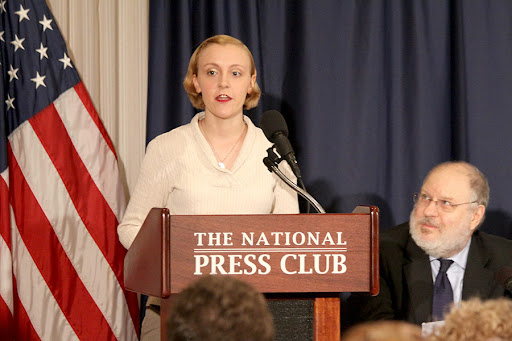
After her first year of college, Jessica McCormick got the dreaded letter from the dean: pull your grades up, or we will dismiss you.
The letter was especially devastating for McCormick, who had spent the last two years of high school in a youth shelter. Aquinas College in Grand Rapids, Michigan, was the roof over her head and her fair shot at earning a degree toward a meaningful career. To make it work, the ambitious, hard-working student saw no other approach but to take on 18 credits, four jobs, and a substantial amount of student loans. So, when that approach failed, “the letter scared the pants off me,” she says.
The dean’s letter stipulated that McCormick take no more than 12 credits, explore financial aid, limit herself to working one job, and increase involvement with the TRIO Student Support Services.
McCormick was already familiar with SSS. On her first day of college, the program provided her instant relief from a rude culture shock. Although West Catholic High School and the Arbor Circle Runaway Homeless Youth program helped her with college preparation, including admission applications and the FAFSA form, nothing prepared her for the alienation she felt when she touched down in a dorm of kids who seemed to want for nothing.
McCormick showed up with only a tiny bag of clothes amid a frenzy of middle-class students unpacking their computers, bedding, toiletries, books, televisions, and other appliances. “I didn’t have any of that. I was this girl coming in off the street, and everyone else was like, ‘I have to call my mom,'” she recalls.
TRIO’s office space below the college cafeteria was a respite. Other low-income, first-generation students homed in there, availing themselves of the programs’ computers, printers, and other resources like help with books and scholarship opportunities. Even though there weren’t many other peers in her situation in the group, McCormick said she could relax in the TRIO Student Support Services area and “didn’t feel like I had to put on my middle-class face.”
Following the dean’s letter carefully, she upped her Student Support Services involvement and arranged to meet weekly with Student Support Services specialist Latonia Plunkett to review progress and discuss challenges. Sometimes Plunkett set her up with a tutor.
McCormick’s GPA skyrocketed to 3.7 in her sophomore year.
Homelessness, however, remained a life-threatening challenge during school breaks. Aquinas provided housing rentals during summer and allowed international and in-season athletes to rent on-campus apartments during vacations. But there was nothing during the winter months for students who had aged out of foster care or were homeless.
McCormick spent part of the Christmas break of her junior year outside in the Michigan cold. Determined to see that no other student would ever experience that, the double major in Sociology and Community Leadership set out to change the system. “Studying is not a priority when you’re hungry, cold, or have survival issues to work on,” she told The Chronicle of Education.
Her 2013 Change.org petition urging college administrators to help students like her find safe, warm housing during the break garnered more than 126,000 signatures. The Aquinas administration agreed to start a dialog with experts and other universities to develop a formal policy and solution. They offered McCormick accessible accommodations and committed to doing the same for any of their other students needing break housing. Nine other Aquinas students came forward. (Some ultimately chose to find alternatives to Aquinas’ offer).
McCormick’s work was prescient. This month, the Wisconsin HOPE Lab and the Association of Community College Trustees released a report showing that many college students lack basic needs. Of the 33,000 students that the information surveyed, half are housing insecure. According to Inside Higher Ed, more colleges are integrating public benefit services into their financial aid.
When McCormick graduated in 2015, she was named “Outstanding Graduate of the Community Leadership Department.”
She decided to move to Washington, D.C., the U.S. city where she thought she could make the most significant difference. Today she works in Human Resources for Sasha Bruce Youthwork, Inc., which helps meet the urgent needs of the District’s at-risk youth and their families.
She also lives in an apartment, another achievement she credits to TRIO. Student Support Services helped her earn a degree. Still, she points out emphatically that TRIO workshops in interviewing, resume writing, and personal finance helped her launch from college with a good credit score. She says qualifying her for an apartment can help protect her from homelessness, even with $65,000 in student loans.
“TRIO has impacted my entire life,” she says.